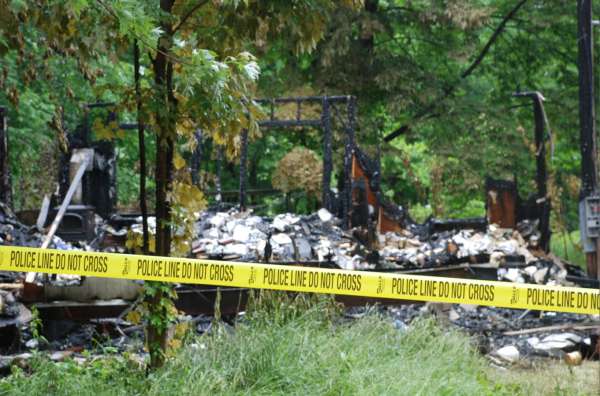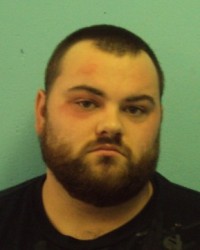

FARMINGTON – A Wilton man was convicted by a Franklin County Superior Court judge of four counts of arson Friday.
D’Kota Rowe, 21 of Wilton, was convicted of two counts of arson, a Class A felony, in relation to a double-wide mobile home on Sewall Street in Wilton as well as a camp in Carthage. Justice William Stokes said that both sets of arson charges would be consolidated and merged into two counts for the purposes of sentencing, which has been set for June 7.
Rowe had previously pleaded guilty to Class B felony criminal conspiracy in connection with the Wilton arson case. Rowe had admitted he helped plan to start a fire at the Main Street residence, but maintained he had not been involved when co-defendants Duane Bailey, 28, of Carver, Mass. and Einer Bonilla, 22, of Grand Island, Neb., had burned the Sewall Street-trailer or the Carthage camp. Additionally, Rowe had claimed that both he and a fourth co-defendant, Devon J. Pease, 23, of Jay, had been threatened by Bailey and Bonilla.
Rowe requested a jury-waived trial and was represented by attorney Christopher Berryment. The state was represented by Assistant District Attorney Joshua Robbins.
Both fires are believed to have been set on the night of June 27, 2015, after Rowe and at least two of his co-defendants had been drinking alcoholic beverages and using heroin, according to Bailey’s testimony in court last month. The four men intended to burn down the house of a Main Street resident in Wilton, due to past issues between a member of Rowe’s family and that resident and a series of texts Rowe had received earlier that day. The defendants picked up a gas can at Pease’s house and went to the Big Apple gas station to fill it up, then proceeded into Wilton in Rowe’s vehicle.
Stokes said that the court found it “significant” that Rowe initially failed to mention the trip to the Big Apple when talking with investigators, and only acknowledged he had pumped additional gas into Pease’s gas can after he was pressed by State Fire Marshal’s Office investigator Kenneth MacMaster during an interview approximately one month later.
“In his recorded interview,” Stokes wrote in his verdict, “the Defendant put most of the blame on Bonilla and Bailey and insisted he was ‘forced’ to participate in the criminal activities that followed. Specifically, the Defendant claimed that Bonilla and Bailey threatened him and Pease and said they would ‘[expletive] us up’ for being rats or snitches.”
After parking off Sewall Street in Wilton, Rowe told investigators that Bailey and Bonilla had headed down the hill toward the Wilton resident’s dwelling. They soon ran back claiming they could not set the fire due to a dog alerting someone inside the house. Instead, they decided to burn a trailer located at 9 Sewall Street. Rowe told MacMaster that he watched the two men pour gasoline around the trailer and light it with a piece of burning paper. He then told Bailey and Bonilla to get back in the car and drove away.
Upon being challenged by MacMaster, Rowe eventually admitted that after dropping off Pease, he drove Bonilla and Bailey back to his residence using a circuitous route that wound through Carthage and Weld over dirt roads. On Winter Hill Road in Carthage, Rowe claimed, he had pulled over to vomit and while doing so, his co-defendants had burned down a nearby camp.
Bailey testified at the trial, with the co-defendant claiming that they had consumed an amount of drugs and alcohol that Stokes termed “extraordinary and frightening,” including marijuana, pure ecstasy, Percocet 30s, heroin and “Caribou Lou,” a mixture of 151-proof and coconut rum and pineapple juice. During cross-examination by Berryment, Bailey admitted to telling numerous lies to MacMaster, falsely accusing Rowe of playing a larger role in the fires. He denied any specific threats had been made to Pease or Rowe, but did admit that he or Bonilla “might” have suggested that Rowe was a “snitch” after the Defendant resisted driving the car.
While there is no evidence that Rowe was guilty as a principal, i.e. starting the fires on either pieces of property, Stokes said, he was guilty as an accomplice. A defendant could be found guilty under accomplice liability if the defendant intended to promote a primary crime and the commission of the secondary crime was a foreseeable consequence, Stokes said, citing state law.
“Once the Defendant knew that Bailey and Bonilla were about to commit an arson on the [Sewall Street] property,” Stokes wrote, “and watched them spread an accelerant around the property and light the fire, he had a critical decision to make since he was the driver of the vehicle and provided the quickest means of escape from the crime scene.” While that decision may have been a “difficult one,” Stokes went on to say, Rowe had made a “conscious decision to stay and assist Bonilla and Bailey to flee from the fire they had just started.”
Stokes said that the fire at the camp in Carthage was a “reasonably foreseeable consequence of the Defendant’s conduct of continuing to drive Bonilla and Bailey around Franklin County,” and that Rowe “was literally in the driver’s seat” of the endeavor.
Stokes also rejected the defense’s argument that Rowe had been under duress by his co-defendants, finding Bailey and/or Bonilla’s alleged threats to be “generalized, vague and non-specific” and not rising to the standard of “real and specific” threats that are “menacingly near” as required by law. Furthermore, Stokes said, Rowe had generally attempted to avoid acknowledging conduct that contradicted his claims of coercion when speaking with investigators. Specifically, Rowe told MacMaster he had no idea why Fire Marshal’s Office investigators would want to speak with him, attempted to conceal the fact he had pumped gas into the can at the Big Apple and temporarily claimed he couldn’t remember what had happened after the Sewall fire.
Count 1 and 2 both related to the Sewall fire, with Count 1 alleging the defendant “started, caused or maintained a fire” with the intent to damage or destroy property. Count 2 alleges that the defendant’s conduct had “recklessly endangered a person or property of another.” Similarly, counts 3 and 4 both relate to the camp on the Winter Hill Road. For the purposes of sentencing, Stokes said, both sets of arson charges would be merged to avoid a violation of Rowe’s double jeopardy rights.
Rowe will be sentenced on June 7. He has been out on $7,500 cash bail since October 2015 without issue, and Stokes ruled those bail conditions sufficient prior to sentencing. He did allow Rowe to travel to Calais for an approximately 24 hour period to attend his stepfather’s funeral, but indicated that the Wilton man should be prepared to go into custody following the sentencing hearing.
In April, Bailey pleaded guilty to two counts of arson, along with burglary and theft charges in connection with three convenience store break-ins. Bailey was sentenced to serve nearly four years of a 12-year sentence and four years of probation.
Pease was sentenced to five years with all but six months suspended and four years of probation. Pease stayed in the car during the Wilton events and was not at the fire in Carthage.





Am I the only one that remembers when the criminal element was relatively intelligent? These guys obviously watched WAY to much TV as kids. I hope the court remembers the risk the firefighters put forth, and the effects to the victims. Send a message- put him under the jail!
It is about time that not only do they do the time for the crime but they PAY for it as well. Every Wilton citizen (and those from the towns and cities who also sent their rescue workers to aid in these crimes) paid from their hard earned dollars -via local/state/federal taxes.
For the rest of their lives (or until full restitution has been made) their wages, state and federal tax refunds, social security benefits, and any other form of income needs to be garnished.
They may be 70 years old and still being garnished but the damage they caused cannot ever be reversed or forgotten.
Very Well Said, George